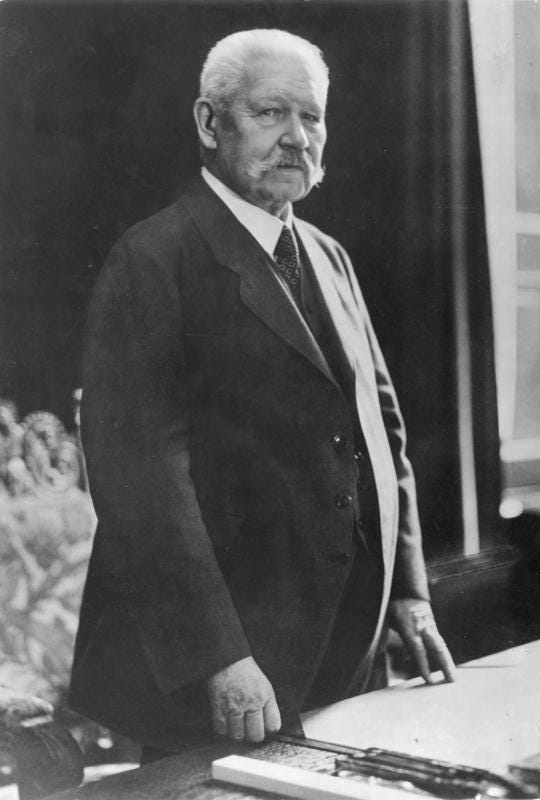Econ: Good morning, Photographer.
Photog: Good morning, Economist.
Econ: "When we look at Donald Trump in the USA today, one can become afraid and anxious when one considers Hindenburg."
Photog: Is it you saying this?
Econ: It is a quote I‘ve heard on the radio.
Photog: Who has said it?
Econ: The historian Wolfgang Niess on Deutschlandfunk, German public radio, this weekend.
Photog: Does the man have a clue?
Econ: Niess wrote the book Zeitbombe Hindenburg about the only Reich President in the Weimarer Republic elected by the German people. More precisely, there were only two. The man before him, Friedrich Ebert, was elected by parliament.
Photog: Tell me more about Hindenburg.
Econ: A picture first.
Photog: You haven‘t shot this, right?
Econ: It is from 1932! It shows Hindenburg standing at his desk. The photographer of the photo is unknown.
Photog: Too bad. Tell me more about this man behind the desk.
Econ: Paul von Hindenburg was elected Reich President exactly 100 years ago, in 1925. He was a despiser of democracy - at the highest level of government. A few years later, to be more precise, on January 30, 1933, he appointed Adolf Hitler as Reich Chancellor, thus becoming the gravedigger of the first German democracy.
Photog: How did Hindenburg do it?
Econ: Niess says he managed to lull his political opponents into a false sense of security and, after being elected, not immediately use brute force to set in motion what he had actually intended. So, Hindenburg proceeded slowly, making concessions to the political centre, such as Germany's accession to the League of Nations in 1926, but never losing sight of his long-term plan to abolish parliamentarism and democracy.
Photog: So, there is something to learn for us today: resisting the beginnings.
Econ: Resist the beginnings! See you in Democracy, Photographer.
Photog: See you in Democracy, Economist.
photo: German Federal Archives, Image 183-R17289 / CC-BY-SA 3.0
Who are Econ and Photog? ……… 🚶♀️🚶🏽





